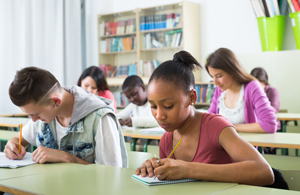 When traumatic events happen in schools, such as the shooting that took place yesterday at Freeman High School in Rockford, WA, it can be difficult for educators to know how to start a dialogue with students. The resources below prepare educators to provide the support and guidance students need to process the event and confront their questions and feelings.
When traumatic events happen in schools, such as the shooting that took place yesterday at Freeman High School in Rockford, WA, it can be difficult for educators to know how to start a dialogue with students. The resources below prepare educators to provide the support and guidance students need to process the event and confront their questions and feelings.
- "The Best Resources On Talking With Children About Tragedies”: Education blogger Larry Ferlazzo’s collection of recommended resources on talking with children about tragedies.
- 15 Tips for Talking with Children About School Violence: Multilingual tips and resources to help parents and educators talk about school violence, discuss events in the news, and help children feel safe in their environment.
- Helping Kids During Crisis: Assembled by the American School Counselor Association, the webinars, websites, and publications on this exhaustive list aid in emotional recovery after a crisis.
- How to Talk to Children About Shootings: The Today Show’s age-by-age guides help educators and parents in addressing tragedies with children.
- "Resources: Talking and Teaching About the Shooting in Newtown, Conn.": Published by The New York Times, this article, written in response to the Sandy Hook Elementary School tragedy, outlines classroom activities to help educators empower students to discuss the event, write about their reactions, and take action.
- Responding to Tragedy: Resources for Educators and Parents: Edutopia offers a compilation of useful, informative, and thoughtful resources for helping children through traumatic situations.
- School Crisis Guide: Created by the National Education Association, this step-by-step guide makes it easier for education professionals to implement effective leadership, crisis management, and long-term mental health support—before, during, and after a crisis.
- School Violence Prevention: Tips for Parents & Educators: Produced by the National Association of School Psychologists, this toolkit offers advice on how to restore students’ comfort and empower them to play a role in their own safety.
- “Taking Aim at Violence in Schools”: Originally published by The New York Times in 1999 after the school shootings at Columbine High School in Colorado, these lesson plans encourage students to share, through discussion and writing, their feelings about violence in schools, as well as about ways in which such events could be prevented.
Alina O’Donnell is the editor of Literacy Daily.